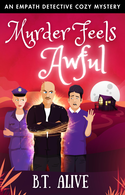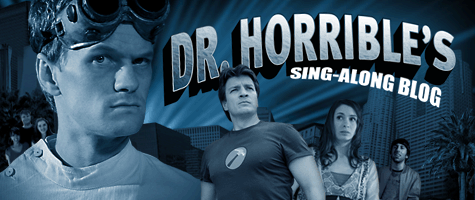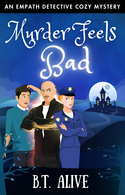How do you make murder funny? Or do you?
YOU MEAN IN REAL LIFE???
No! I mean stories. Murder mysteries.
How do you take something as horrifying as murder and weave it into a story that’s actually fun? Much less funny?
HMM. YEAH, THAT IS KIND OF WEIRD.
Isn’t it? I mean, these are detectives trying to catch dangerous criminals who’ve killed people. No wonder so many mysteries are, well, dead serious. (Sorry.) 😊
But some mystery series do pull it off. How?
I hadn’t thought about this question until I started writing Murder Feels Awful, but it’s actually really complicated.
And for my own Empath Detective series, it turned out to be even more complicated than usual. Why?
Because I knew I wanted this series to be more than just funny.
WHY “MORE”?
Because murder really is terrifying. When I was in college, a close friend of mine lost his brother to a violent murder. I still can’t imagine what he went through, but even for me, that seared me for life.
For me, a mystery series that trivializes an unceasing stream of murders has a serious attitude problem. It feels deeply disrespectful. To pretty much everyone.
And yet, here I am writing these goofball murder mysteries that readers are telling me make them laugh out loud. How can this possibly work?
Well … I’ll leave whether it actually works to you. 😄 But the cool part is, even trying to write a mystery that can range from funny, to scary, to exciting, to tragic, all in the same book, winds up being a masterclass in story structure.
WAIT, WHAT’S A “MASTERCLASS”?
I actually don’t know. I just see it everywhere now.
I think masterclass means, “A class taught by someone who does their own marketing.”
Anyway, turns out, there are key story decisions that you make right at the start. You have to get them just right, or the whole story won’t work like you want it to.
That’s why it matters that I didn’t just want to be funny. If you just want to be funny here, it’s fairly simple.
REALLY? WHAT ARE THE “SIMPLE” WAYS TO WRITE A FUNNY MYSTERY?
By “simple,” I don’t mean it’s totally easy. It still takes massive storytelling skill to pull it off.
I just mean that with a “simple” approach, the story tends to be either mostly light, without much emotional punch, or else mostly serious, with maybe not so much actual, um, humor. Which is FINE … as long as that’s what you’re trying to write.
So. First off, a funny mystery series usually requires a team. It’s hard to be funny all on your own.
(I learned this the hard way with an early mystery short story I wrote with a solo detective who went around office cubicles brandishing a sword. At the time, I thought it was pretty hilarious, but as you may be shocked to hear, it had some structural issues. I do still like the title, though … The Affair of the Hideous Vase.)
Once you have your team, a solid approach is just to make them both goofballs. Probably no one’s ever done this better than Psych.

I admit, I devoured that show. So fun.
(Yes, it does pretty much trivialize an unceasing stream of murders. But at least they really are hilarious.)
Another take is to give the detective a flaw or disability that’s a steady source of cringe humor. This is how Monk works (unless you actually know someone with OCD … then it’s mostly just cringe).

Yet another approach is to build in a smoldering romance that lasts approximately eighteen years, and then rely on witty banter in between all the police procedural gruntwork…

Okay, sorry for the snark, I just loved Firefly and so I came to Castle expecting so much more from anything with Nathan Fillon…anyone with me on this?
Also, I should acknowledge that Castle does acknowledge the more grim reality of the whole murder thing. That’s important.
Still, I may have to go watch Dr. Horrible’s Sing-Along Blog to feel better again about Nathan Fillon’s limited time on this earth to make amazing television…
THAT’S NOT A MYSTERY.
No, it’s not.
But this is…and it’s my Secret Funny Mystery Weapon…

YOUR “SECRET WEAPON” IS…SHERLOCK HOLMES?
No.
My secret weapon is Sherlock Holmes and Watson.
Only a few readers so far have noticed how deeply the Mark and Pete dynamic is modeled on Holmes and Watson.
Watson is critical to the success of the Holmes stories … without him, there’s no way we’d still be reading them and adapting them for TV a hundred years later.
Watson solves crucial storytelling problems.
Watson Keeps Holmes Mysterious
For starters, obviously, being in Watson’s head means we don’t know the solution until the end. That’s pretty basic.
But it’s only the beginning.
Holmes doesn’t just solve mysteries, he is mysterious. Holmes' powers of deduction are a straight-up superpower.
But Holmes doesn’t feel it’s amazing himself. He can’t. He lives with it.
Through Watson, We Keep Being Amazed
So we need the distance of Watson telling the story. With Watson as our point of view (POV), he can keep being amazed, over and over again, at Holmes’ astounding feats. And since Watson’s amazed, we are.
Imagine if Holmes were telling the story. It would totally break the whole thing. He would just drone on about exactly how he figured out every last scintillating detail.
Oh wait, you don’t have to imagine. Towards the end, Arthur Conan Doyle did try having Holmes narrate two of his own stories. No Watson. Ugh.
Watson Has the Heart
Let’s face it, Holmes is a brainiac (with addiction issues). Watson brings the emotional grounding, both in his compassion for the suspects and also, as the stories progress, Holmes himself.
Other writers have tried to imitate this team dynamic (for instance, Agatha Christie with Poirot and Hastings), but I think this heart and enthusiasm often get missed.
We need more than just a sidekick whose ignorance keeps us mystified until the end. We need a friend who cares … and a detective who needs it.
THAT’S COOL AND ALL, BILL … BUT THE HOLMES STORIES AREN’T EXACTLY HILARIOUS. I THOUGHT WE WERE BEING FUNNY…?
Not just funny. That’s the thing. With the freedom of a Watson-type POV, you can tell a much richer story.
For me, staying grounded in Pete’s POV lets me escape to his humor and goofiness over and over again. Yet, at any moment, he can instantly be pulled back into Mark’s grim world of sensing people’s pain and catching murderers. That freedom and tension is at the heart of what makes these stories work.
But Arther Conan Doyle used that freedom to balance the need of his stories for friendship and compassion with how much he wanted to geek out about every last deductive detail.
You might use this same dynamic to balance a whole different set of opposing forces in your series. The options here are incredible.
For a much richer mystery series, consider giving your detective a “Watson” who’s really different from your detective … and then really staying in your Watson’s point of view, to keep your detective’s superpower mysterious and surprising.
WOW. HUH. AND THAT’S REALLY ALL THERE IS TO MAKING MYSTERIES FUNNY?
What? No way. I’m just getting started. But that’s why the title here is “Part 1”. I’ll have to save more author secrets for another day…
Talk to you soon! Happy reading!
![[Bill Alive]](/images/authors/bill_alive_200x_mangos.png)
Bill Alive
P.S. What about you? What you think? Any other Holmes-Watson mystery duos I should know about? Please leave a comment, I’d love to hear. Thanks!


